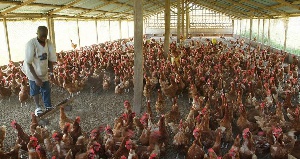The Poultry Farmers’ Association of Ghana (PFAG) has urged the government to develop a comprehensive policy, aimed at re-engineering the poultry industry as a major economic driver.
The association said there are huge economic opportunities along the poultry value chain such as employment and meat production but it requires national policy direction and commitment to harness these potentials.
In an interview with B&FT, the Brong Ahafo Regional Chairman of the association, David Kwabena Ampofo, said the industry is currently inundated with a plethora of challenges that unreservedly warrant the utmost attention of policymakers, citing the excessive importation of frozen chicken as a “killer trade policy.”
“Government must create an enabling environment for local producers to thrive; access and cost of credit continue to threaten business survival. Amidst all the challenges, domestic producers have to compete with importers who source from highly subsidised economies; this is very unfair; there should be equal opportunities for all.”
Local poultry farmers, he indicated, have the skill and capacity to meet the national demand (eggs and meat), provided the government is willing to cushion the industry with the necessary business incentives and policy frameworks, he noted.
He cited the troubles of farmers in the Dormaa area of Brong Ahafo as an epitome of the larger situation across the country.
Checks by the B&FT revealed that farmers in Dormaa, one of the leading poultry production zones in Ghana, source inputs like maize, chicks and paper-egg-crates from Cote d’Ivoire.
For instance, maize farmers in the region are unable to produce enough to meet the huge demand of poultry industry, thus compounding cost of production.
Veterinary laboratory rusts away
In a related development, a laboratory meant for the Veterinary Service of the Ministry of Food and Agriculture (MoFA) at Dormaa-Ahenkro has become a ‘white elephant.’ The laboratory, which was constructed in 2004, is yet to be furnished with the requisite equipment for it to function.
The Veterinary Officer in charge of the Dormaa Central Municipality, Dr. Yaw Gyekye, told the B&FT that the incapacitation of the laboratory has negatively affected animal husbandry, particularly commercial poultry production, in the area.
Farmers within the vicinity have to send their samples to Kumasi and Accra for proper testing, whenever the need arises. He appealed to government to resource the laboratory to aid the work of the Veterinary Service there.
Business News of Monday, 4 December 2017
Source: thebftonline.com













